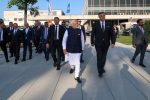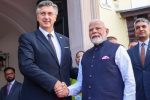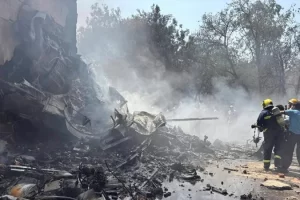India is highly vulnerable to terrorism and security concerns, frequent terror attacks in India remains one of the important determinants in pulling its growth down, but it is not limited to India or few countries, now it has spread almost all over the world. Security issues today is a global menace, as inequality is there in every country, although in a different degree. Those who are dissatisfied with the authority adopt the method of violence to show their dissatisfaction. One more thing which can be seen today as a major cause of the same is religious intolerance.
For an example recent terror attacks in Sri lanka after the pulwama attacks in India, and attacks on Charlie Hebdo office in Paris, frequent murders of bloggers in Bangladesh, the ongoing war in Syria etc. Even the most developed countries like U.S.A and Russia are also facing these kind of problems. Such wars not only affect the victim country but also its neighboring countries as they face the problem of unwanted refugees. Such terror attacks are done purposefully to attract the attention of authority, their objective is to capture political power. Despite being a top-up problem all over the world, there is not a single agreement on ‘terrorism’ at international platform whereas there are number of economic, social and political agreement and this menace has not gain any place at international level, even what terrorism is? Who is a terrorist? Has not been defined yet. Every country has adopted a different definition of terrorism and terrorist, even some countries also support terrorism.
In the recent literature titled, Whither INDIA in 2022? Edited by Ambassador Surendra Kumar, pointed out a ‘Kaleidoscopic Approach’ of maturing of democracy in a bewilderingly diverse India. For many instance like fault lines of governance, urbanisation, Trade and Industry, energy security, environmental challenges, national security, internal security and menace of terrorism, defence preparedness, future of India-US relations and the vision of Sabka Saath, Sabka Vikas etc.. The Country believes in adoption of the Comprehensive Convention on International terrorism at the United Nations. Although, The book deals with ‘dispassionate discourse’; Which highlights what deserves to be applauded and doesn’t shy away from calling a spade a spade, if needed.. As per the Description of book, Contrary to Cynics, a lot has been achieved in India since independence, especially in the last 30 years. Yes, the point of view that the country should have grown faster like several other countries is a valid point..
Alok Bansal, Director of India Foundation and a well known defence expert remarked in his recent book titled, “Gilgit-Baltistan and It’s Saga of Unending Human Rights Violations“, In a knowledge driven world, ignorance is no bliss. Blatantly put, ignorance of facts is a curse that Nations and its people will pay for heavily in terms of security, strategy and overall handling of situations. India has faced many existential crisis over the years due to lack of comprehensive information or misinformation, the most glaring being the valley issue. The common man is oblivious to a lot of critical information about the same including a region as strategic as Gilgit-Baltistan being a part of Jammu & Kashmir. Thus, This narrative is an attempt to lift the veil of ignorance about this region and make it a part of the national strategic dialogue at large.
As per the Indian Navy, For betterment of India’s security concern, Two frontline indigenously designed and built Indian naval ships participating in exercise are- INS Sahyadri, a multi-purpose guided-missile frigate and INS Kiltan, a ASW (anti-submarine warfare) Corvette. In addition to ships, a P8I (Poseidon Eight India) Long Range Maritime Patrol Aircraft has also reached Japan for the exercise. While the US Navy, It is being represented by USS McCampbell (DDG-85), a Los Angeles-Class Attack Submarine, and a ‘P8A’ Long Range Maritime Patrol Aircraft. And ‘Japan Navy’ popularly known as The Japan Maritime Self-Defence Force (JMSDF), It is participating with its JS Kaga, a Izumo class helicopter destroyer, JS Samidare and Choukai, a guided-missile destroyers and a ‘P1’ Long Range Maritime Patrol Aircraft.
Moreover, This is a time for “Transforming and modernising Indian defence sector” to combat both, the internal as well as external threats worldwide. In this regard, The “INS Khanderi” is commissioned, carries forward the legacy of her namesake, a Soviet Foxtrot Class, which was India’s second submarine overall and was in service of the Indian Navy for 21 years. This is the first ship of Project 17A, the Project frigates is a design derivative of the Shivalik class stealth frigates with much more advanced stealth features and ‘indigenous weapons and sensors’. It is being built using integrated construction methodology. It frigates incorporate new design concepts for improved survivability, sea keeping, stealth and ship manoeuvrability and much more.. Historically, The first INS Khanderi was commissioned in December 1968 and pulled out of service in 1989. The submarine’s motto ”Akhand Abhedya Adrishya” indicates the unity of the crew, indomitable spirit and stealth of the platform.
Meanwhile, As per Prime Minister Narendra Modi remarked that, “Quit India was a landmark movement in our history. Inspired by Mahatma Gandhi’s clarion call of ‘Do or Die’ people across India actively pledged to devote themselves for India’s freedom. The Pledge is to build a New India by 2022; an India that is devoid of corruption, is clean, has no poverty, is free of terrorism, has no distinction on the basis of caste and religion.
However, Today’s the meaning of security acknowledges political, economic, environmental, social and human among other strands that impact the ‘concept of security’. In the most fundamental terms, the concerns for security of the lowest common denominator of every society, resulted in the development of the concept of ‘human security’. Hence, Today’s ‘internal security’ requirements have grown phenomenally.
In the Context of China Pakistan economic corridor (CPEC), It is going to reduce the distance by 12000 km for china from middle east, which would benefit china for its energy imports from middle east. For the Pakistan it would benefit it economically through various related projects, china is also going to develop Gwadar sea port of Pakistan which is rather underdeveloped.
Further, this project will give China direct access to Indian Ocean’s Arabian Sea through Gwadar port, which is again strategically important for India’s security concerns. So here comes the concerns of India as this economic corridor passes through ‘POK’ which is a territorial dispute between India and Pakistan. And this region is strategically important for India for its security concerns, thus development of any such infrastructure in this territory is a great matter of concern for India.
Also, It seems that terrorism is gaining some momentum in international floor, it can be taken as an opportunity by India to attract global attention towards this issue seriously and so that the world could come at single conclusion and agreement about terrorism, which could help India end its vulnerability to terrorism and grow peacefully further. To utilize the mission in its real potential, what we need is a strict privacy policy, and stricter laws governing public information and the most important readiness to face any “cyber attack” challenges to assure the citizens of their security.
Moreover, NSCN (IM) and NSCN (K) and other insurgency groups are active in the north east region of India creating problems in law and order situation of the area. This region is vulnerable to such activities since independence and so far, it has also remained a major menace for government in maintaining its security, unity and integrity of India. People of north east region are also suffering a lot because of this, this region has been mostly controlled by military actions yet.
Therefore, The need of the hour is defining terrorism at international level, there is requirement of a unified definition and provisions, a stricter international law is needed to counter terrorism, which should clearly define what terrorism is, who is terrorist, what should be the path to be followed by the countries in this regard, what would be the punishments for the countries supporting terrorism and so on. Our fastest growing economic status fuelled by a more than 300 million strong middle class, the demographic advantage of a burgeoning ‘young population’, our increasing ventures into high-technology areas such as Space technology, DRDO’s, and future projections of national growth may peg us amongst the world’s top economies by 2050.
Significantly, The war on global terror can only be won through a process of dialogue among nations where the discourse is focused on the international repercussions of what is an international security threat. Such a discourse, which is anchored in human rights, but not constrained by it, must transcend national interest and look at terrorism for what is – a threat to delicately balanced peace and security architecture, Excerpted from the book “Delusional Politics” (Penguin) by Hardeep Singh Puri, Minister of State for Housing and Urban Affairs in the Government of India.
In the absence of an agreement over the definition of “terrorism”, what must be made clear is that there is no such thing as a “good” terrorist, and responsibility for the tragic loss of life and property as a result of this “good” theory must be affixed on states supporting these claims. However, Terror plots only come to fruition with the help of governments/agencies that, under the garb of ‘non-state’ actors, propagate proxy wars and use terror as a tool for achieving their geostrategic goals.
Here is the Recent Book Launch & Discussion on “Whither India in 2022?”
, Former Director General at Border Security Force, Mahendra Kumawat remarked a significant chapter named, “National Security and International Security”. A must read for those who want to figure out where India is heading to..
The major concept ranges from internal security tasks, augmenting diplomatic effort, bilateral and multi-lateral cooperative efforts with other countries, humanitarian assistance and environmental relief and go on to cover the entire range of tasks across the full spectrum of conflicts. For Many authors, The requirement for greater integration of the Armed Forces with the Ministries of Defence, and External Affairs, as well as establishment of effective coordination mechanisms with several other ministries and agencies are becomes important today.
Meanwhile, National Security Advisor (NSA) Ajit Doval recently, remarked that the government is capable of carrying out “retaliatory strikes” against any act of terrorism. “Terrorism should be dealt with utmost priority. The current government is capable of dealing with any kind of internal and external threats. We have decision-making ability for retaliatory strike according to suitable time and place,”.
Despite all of this, Readers should be aware, however, The concerned book contains many factual data relating to the ongoing security issues, contemporary status, and the enquiry of government enhancement on National and International Security concerns such as defence, terrorism, Energy security, Menace of climate change and the changing prospects of Indo-US deals etc. But discussions on National Security in our Nation have been left largely to think-tanks and academics, and whilst they may do some valuable work in this direction, they lack the executive powers to put thought into action..
























